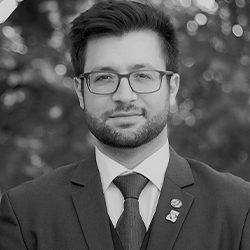Academic Board

Dr Maria (Maki) Haberfeld,
Professor of Police Science,
Academic Director of Police Leadership Program for the NYPD sworn officers,
John Jay College of Criminal Justice,
City University of New York (Chair of the Institute of Public, Cyber and National Security Academic Board)
Dr Maria (Maki) Haberfeld
Dr Maria (Maki) Haberfeld
Dr. Maria (Maki) Haberfeld is a Professor of Police Science, at John Jay College of Criminal Justice in New York City. She holds a PhD in Criminal Justice from City University of New York. She served in the Israeli Defense Forces in a counter-terrorist unit and left the army at the rank of a Sergeant. Later she served in the Israel National Police and left the force at the rank of Lieutenant. She is one of the co-creators of Police Leadership Program for the NYPD sworn officers and the Academic Director of this program since its creation in 2001 where she also teaches courses on counter-terrorism and police ethics. In addition she has created the Law Enforcement Leadership Institute for Police Chiefs in NY State and created an on-line Law Enforcement Leadership Certificate. She has trained police forces around the country and the world including, the Dominican Republic, Czech Republic, Poland, India, China, Cyprus, Turkey, Mongolia, Taiwan and conducted research in over 70 police departments in the US and in 35 countries. Dr. Haberfeld also developed and trained some units of the US Military forces, including the U.S. Marines. She conducts an on-going research on counter –terrorist tactics employed by police departments around the country and recently visited police departments in Israel and Belgium as part of this project. She is currently a consulting expert on the European Union sponsored grant on railroad security – SHERPA. Her publications include: A New Understanding of Terrorism (co-editor, 2010), Modern Piracy and Maritime Terrorism (co-editor, 2012), Terrorism Within Comparative International Context (co-author, 2009), Russian Organized Corruption Networks and their International Trajectories (co-authored, 2011), Critical Issues in Police Training (2002, 2013; 2018), Police Organization and Training: Innovations in Research and Practice (co-edited, 2011) Police Leadership: Organizational and Managerial Decision Making Process (2012), Policing Muslim Communities (co-authored, 2012), Match-Fixing in International Sports (co-edited, 2013), Introduction to Policing: the Pillar of Democracy (co-authored, 2014, 2017) Measuring Police Integrity across the World (co-edited, 2015) and Exploring Police Integrity (co-edited, 2019). She is also Series editor of Springer Briefs in Policing, where she recently co-edited 3 briefs on Community Policing and Technology (2018, 2019).

Dr Rebecca Milne,
Professor of Forensic Psychology,
Director of the Centre of Forensic Interviewing, Institute of Criminal Justice Studies,
University of Portsmouth
Dr Rebecca Milne
Dr Rebecca Milne
BSc (Hons). PhD CPsychol CSci AFBPsS
Becky Milne is a Professor of Forensic Psychology at the Institute of Criminal Justice Studies at the University of Portsmouth. The main focus of her work over the past twenty years concerns the examination of police interviewing and investigation. Jointly with practitioners, she has helped to develop procedures that improve the quality of interviews of witnesses, victims, intelligence sources, and suspects of crime across many countries. As a result, she works closely with the police (and other criminal justice organisations), creating novel interview techniques, developing training, running interview courses, and providing case advice. She is also the Director of the Centre of Forensic Interviewing, which is an internationally recognised centre of excellence for investigative interviewing that brings together research, teaching, and innovation activities. Becky is a member of the National Police Chiefs Council (NPCC, UK), Investigative Interviewing Strategic Steering Group and was part of a writing team who developed the 2007 version of the Achieving Best Evidence document, National guidelines for interviewing vulnerable groups. She is an Affiliate of CREST. She was given the Tom Williamson award for her outstanding achievements in the field of investigative interviewing by NPCC in April 2009.

Dr. Maria Ioannou,
Professor in Investigative and Forensic Psychology,
Director for the Secure Societies Institute,
MSc Investigative Psychology & MSc Security Science,
University of Huddersfield
Professor Maria Ioannou
Professor Maria Ioannou, PhD
Professor in Investigative and Forensic Psychology; Director for the Secure Societies Institute, MSc Investigative Psychology & MSc Security Science.
Professor Maria Ioannou (BSc, MSc, PhD, C.Psychol, CSci, AFBPsS, FHEA, CMgr, MCMI), is a Chartered Forensic Psychologist (British Psychological Society), HCPC Registered Psychologist (Forensic) and an Associate Fellow of the British Psychological Society
She is the Director for the Secure Societies Institute, MSc Investigative Psychology and MSc Security Science.
She joined Huddersfield University in 2009 as a Senior Lecturer. Prof Ioannou obtained a first-class undergraduate degree in Psychology, Philosophy and Pedagogics from the University of Ioannina, Greece in 2000. In 2001 she completed her MSc in Investigative Psychology at the University of Liverpool. Her dissertation was on the Criminal Narrative Experience focusing on the roles that offenders act out and the emotions they experience while they are committing their crimes. She developed this research for her PhD, which she completed in 2006.
Prof Ioannou has considerable experience in exploring offender and victim profiles and has been involved in the assessment and development of intervention programmes for reducing/preventing crime for a range of different forms of criminality and groups of offenders and ‘at risk’ individuals as well as impact delivery. Typically, these evaluations have required assessments of change/impact/influence of the interventions on individuals and their criminal behaviour as well as assessments of the overall programme itself.
She has delivered a variety of courses to professionals (i.e. law enforcement personnel, teachers, youth workers) as well as applied research, case reports and consultancy projects to police, government authorities, intervention agencies and other public bodies (i.e. Safer Merseyside Partnership, Liverpool City Council, Merseyside Police, Lancashire Constabulary, the Ministry of Defence, Irish Prison Service, Irish Police Force, West Yorkshire Police, Home Office, Thames Valley Police, Thames Valley Police and Crime Commissioners Office). She has also contributed to various legal cases that involved among others preparation of background material and investigative advice on Forensic Psycholinguistics/ Questioned Authorship Attribution, interpretation of psychological measures on a case of offender profiling with personality and other psychometric assessment and analysis of the psychological features indicated within personal documents.
Prof Ioannou has been invited to train law enforcement and security personnel as well as give lectures and seminars in a number of countries all over the world (i.e. USA Air Force, Egypt, Thailand, Greece, Bahrain, Iraq, Libya, Ireland, Italy). She also sits on the Merseyside Police Evidence Based Policing Steering Group and is on the board of the Yorkshire and Humberside Fraud Forum. She has extensive media experience across all platforms appearing recently on CNN and BBC radio and her work has been presented nationally and internationally.

Dr. Maria P. Michailidis,
Professor at the Management department and the Director of the Markidakis Open Forecasting Center (MOFC) of the Institute For the Future (IFF), of the University of Nicosia
Dr. Maria P. Michailidis
Professor at the Management department and the Director of the Markidakis Open Forecasting Center (MOFC) of the Institute For the Future (IFF), of the University of Nicosia
Dr. Maria P. Michailidis is a Professor at the Management department and the Director of the Markidakis Open Forecasting Center (MOFC) of the Institute For the Future (IFF), of the University of Nicosia, Cyprus. She has served as the Dean of the School of Business from 2012-2017 and Head of the Management and MIS from 2008-2012. She has been educated in the USA where she obtained her Doctorate from the University of Massachusetts. She specializes in Management, Social and Clinical Psychology, Educational Leadership. She is Psychotherapist in the Person-Centered Approach (PCA). Dr. Michailidis is the author of many journal articles and book chapters as well as the editor of several books. In addition, she possesses a considerable industrial and teaching experience from work she has done in the States and Cyprus. In addition to her research, professor Michailidis is also a regular speaker at International conferences. Her research interests include topics related to industrial organizational psychology and her work has been supported by European grants, including projects such as Leonardo da Vinci, Socrates/Erasmus Thematic Networks and Grundtvig Multilateral Projects and COST Actions. She is a member of the Board of Directors of the Elpida Foundation for children with cancer and leukemia and of the A.G. Leventis Foundation Scholars Association.

Dr Ioanna Dionysiou,
Professor of Computer Science,
Associate Head of the Department of Computer Science,
University of Nicosia
Dr Ioanna Dionysiou
Professor of Computer Science at the University of Nicosia
Dr Ioanna Dionysiou is currently a Professor of Computer Science at the University of Nicosia. She serves as the Associate Head of the Department of Computer Science since April 2018. Dionysiou received her PhD from Washington State University (2006) and during her graduate studies she held teaching and research assistant appointments. Her PhD dissertation work investigated trust requirements and challenges for large-scale infrastructures, with an exemplary infrastructure being the US Electric Power Grid. Dionysiou’s PhD research was supported by three USA national organizations: NIST (National Institute of Standards and Technology), NSF (National Science Foundation), and DOE (Department of Energy).
Dionysiou’s current research focuses on trust, security and data protection models in collaborative environments. She is the co-director of the Informatics Security Laboratory (ISL) at University of Nicosia, which aims mainly on devising new techniques to detect cyberattacks by analyzing attack patterns and visualizing attack attempts in an intuitive manner. Other lab research activities include, among others, applied security standards (ISO 27001), multidisciplinary security practices, data protection, and cyber warfare.
Dionysiou co-authored numerous publications on trust management, security, and data protection. She served in various conference committees as an organizing member, track/session chair, and program committee member. She is member of various boards, including the Cyprus ECSC (European Cyber Security Challenge) Advisory Board. She has participated in locally-funded and European-funded research projects. She is teaching numerous undergraduate and graduate level security courses at University of Nicosia, including Computer security, Cryptography and Network Security, and Cyber Warfare.

Dr. Stavroula Soukara,
Associate Professor of Forensic Psychology,
Programme Coordinator of MSc/PhD Criminology,
University of Nicosia
Dr. Stavroula Soukara
Dr. Stavroula Soukara
Associate Professor of Forensic Psychology and the Program Coordinator of MSc / PhD in Criminology at the University of Nicosia.
Dr. Stavroula Soukara is an appointed member to the Council of Crime Prevention and Civil Protection Centre at the Ministry of Justice and Public Order in Cyprus, and she has also served as a visiting academic to Cyprus Police Academy for a number of years. In addition, she has been an expert on the list of CEPOL’s database as well as external supervisor to the Cyprus Committee on Missing Persons. She received her BA (Hons) in Psychology from Sussex University (UK), her MSc in Criminal Justice Studies, her PGDip in Psychological Research Methods and her PhD in Forensic Psychology from Portsmouth University (UK). Dr. Soukara cooperated for a number of years with British Police and her recommendations are being used for advanced training and educational purposes by British police officers. She worked for 4 years as a full time academic at Hellenic Police Academy and Hellenic National Security School in Greece, where she offered expert advice and training as well as being a member of both their educational council and their thesis examination committee. Dr. Soukara has published her work in various peer-reviewed journals and presented at a number of conferences worldwide; one of her publications is included as representative bibliography at the FBI Academy. Her research interests focus mainly on false confessions and miscarriages of justice, as well as suspect and witness investigative interviewing.

Dr Demetra Sorvatzioti,
Associate Professor,
Law Department,
Head of the Institute of Criminal Justice Studies and Criminology and the Cyprus Centre for Law and Justice,
University of Nicosia
Dr Demetra Sorvatzioti
Dr Demetra Sorvatzioti
Associate Professor in the Law Department of the University of Nicosia
Demetra Fr. Sorvatzioti is an Associate Professor in the Law Department of the University of Nicosia and has been practising law since 1990, in Greece and as of 2005 in the Cypriot jurisdiction. She holds a Ph.D. in Criminology. She heads the Institute of Criminal Studies and Criminology and the Cyprus Center for Law and Justice (C.C.L.J) at the University of Nicosia and she has served as Head and Associate Head of the Law Department. She heads the board of the University of Nicosia for the joint Master of Criminal Law and Addictions with the Law School of Aristotle University. Dr. Sorvatzioti is member of the advisory board of Fair Trials International, and member of the Crime Policy board of the Ministry of Justice in Cyprus. She is also official collaborator at the International Center of Comparative Criminology (CiCC) of the University of Montreal.
Her expertise is criminal law; evidence; criminal procedure; criminology and applied criminal justice. Her research areas are on comparative law; sentencing; evidence; drug offences & addiction; sexual offenders; social exclusion & criminal justice. Her most recent research is on fair sentencing and sentencing drug addicted offenders and sexual offenders.
She has given lectures in Europe, Canada and the United States and she has participated in numerous international conferences. Her publications among others include: “The poverty of Justice”; “Sexual offenders: Crime and Sentence” with A. Maganas, Burden of Proof and L’intime conviction: Is the Continental Criminal Trial Moving to the Common Law, with A. Manson; “L’ Intime Conviction’ and the Principle of Legality”; “Poor migrants and effective legal representation in Criminal Cases via Legal Aid Scheme”; “The Drug Treatment Court Model Applied”; Gambling addiction as Fresh Evidence in a case of drug cultivation. Motive of Crime and Mitigating Factor for the Sentence.

Constantinos Adamides,
Associate Professor of International Relations and Director of the Diplomatic Academy at the University of Nicosia
Constantinos Adamides
Constantinos Adamides
Associate Professor of International Relations and Director of the Diplomatic Academy at the University of Nicosia.
Dr. Constantinos Adamides is an Associate Professor of International Relations at the University of Nicosia, where he also serves as the Director of the Diplomatic Academy. Further to the academic activities at the University, he frequently cooperates with the Ministry of Foreign Affairs and Defense, the National Guard, with foreign diplomatic Missions in Cyprus, as well as other international organizations that focus on diplomatic and security-related issues, such as the George C. Marshall Center for Security Studies in Germany and the Center for Study and Practice of Conflict Resolution at the University of Malta. Dr. Adamides was also appointed by President Nicos Anastasiades as a Member of the first Geostrategic Council of the Republic of Cyprus (2014-2018), contributing to the development of reports and analyses for the President and/or other government officials on issues pertinent to geopolitical developments. Furthermore, he was appointed as a member of the inter-ministerial task force responsible for drafting the first Cypriot National Security Strategy.
Constantinos holds a PhD in Political Science and International Studies, an MA in Diplomacy and International Relations, an MBA in Finance, and a BSc in Finance and Political Science. His research focuses mostly on protracted conflicts, security, future of warfare, cyber security, national security strategies, terrorism, EU foreign and security policy, and securitization theory.
For a detailed CV and more information visit: http://unic.academia.edu/ConstantinosAdamides.

Dr Daniel Silverstone,
Director of the School of Justice Studies,
Reader in Policing Studies,
Liverpool John Moores University
Dr Daniel Silverstone
Director of the School of Justice Studies
Dr Daniel Silverstone is Director of the School of Justice Studies, which consists of three disciplines, Policing Studies situated in the Liverpool Centre for Advanced Policing Studies, Criminology and Criminal Justice. It is one of the largest centres of criminological expertise in the UK. He is also a Reader in Policing Studies.
After working at the Institute of Criminal Justice Studies at Portsmouth University, he worked as the Head of Criminology at the John Grieve Centre at London Metropolitan University. His main research area is the incidence of Serious and Organised Crime and its effective combating. He has completed many research projects including commissions for the Independent Anti-Slavery Commissioner, the Foreign and Commonwealth Office and the Home Office. He has a particular interest in understanding the dynamics of human trafficking and works as an Expert Witness in trafficking trials. He studied for his degrees at the London School of Economics.

Dr Alexander Meleagrou-Hitchens,
Lecturer in Terrorism and Radicalization,
War Studies Department,
Kings College London
Dr Alexander Meleagrou-Hitchens
Dr Meleagrou-Hitchens is Lecturer in Terrorism and Radicalisation at the War Studies Department in King’s College London. His research interests focus on the ideology and strategy of extremist social movements in the West, with a particular interest in militant Islamists and the extreme right. He has written widely on the topic and his book, Incitement: Anwar al-Awlaki’s Western Jihad, will be published in May 2020. His second book book, Homegrown: ISIS in America, will be published in October 2020.

Dr Dmitry Apraksin,
Head of IT Department,
Lecturer of Computer Science,
University of Nicosia
Dr Dmitry Apraxin
Head of IT Department, Lecturer of Computer Science, University of Nicosia
Dr. Dmitry Apraksin, was born in 1963 in Russia. In 1985 he graduated from the Moscow Institute of Management (Moscow State University of Management, at present) and completed his PhD studies in 1989 in MIS. From 1986 until 1990 he worked as an assistant professor at the Moscow State University of Management. During the same period he was a consultant for a number of intelligent text processing projects at the Ministry of Education, the Ministry of Interior and the Supreme Court of the Russian Federation. For his performance, Dr. Dmitry Apraksin was included twice in the List of Gratitude for his service to the State by the Ministry of Education.
During the period from 1990 to 1993 he was a Technical Director of Soviet American Joint Venture company SAMAN which specialized in producing Computer Based Training (CBT) courseware.
Since 1994 Dr. Apraksin started working at Intercollege which later became the University of Nicosia. At Intercollege and the University of Nicosia, Dr. Apraksin has taken the positions of Senior Computer Supervisor, Head of Computer Center and Head of IT (at present). In addition to the above administrative duties, Dr. Apraksin is a Lecturer of Computer Science Department. Among his recently taught courses are Principles of Information Security, Network Defense and Countermeasures, Programming the Internet, Advanced Database, Business Intelligence, Digital Currency Programming and Mobile Computing.
His scientific interests include Database Development and Design (Relational, Object-Relational, NoSQL, etc.), Big Data Processing, Intelligent Text Processing, Cyber Security and Cloud Computing.

Dr Alexia Zalaf,
Associate Professor of Criminology, University of Nicosia
Dr Alexia Zalaf
Dr Alexia Zalaf
Assistant Professor of Criminology at the University of Nicosia
Dr Alexia Zalaf holds a BSc in Psychology from the University of Sussex, UK and a MSc in Forensic Psychology from the University of Kent at Canterbury, UK. She completed her PhD in Psychology from the University of Leicester. Following the completion of her PhD, she joined research teams working with the Domestic Violence and Child Abuse Office of the Cyprus Police and the Association for the Prevention and Handling of Family Violence. Since 2014, she has been actively engaged in teaching and research in the field of forensic psychology and was a member of the teaching staff on the MSc Forensic Psychology course at the University of Central Lancashire (Cyprus campus). Dr Zalaf maintains her links with the Association for the Prevention and Handling of Family Violence and is actively involved in the promotion of domestic violence issues throughout Cyprus.
Areas of interest:
- Domestic violence
- Individual differences and personality
- Dark personality traits
- Animal abuse and animal welfare
- Forensic psychology and criminology topics

Angelo Constantinou,
(Adjunct) Lecturer in Criminology, Open University of Cyprus
Dr Angelo Constantinou
(Adjunct) Lecturer in Criminology, Open University of Cyprus
Angelo Constantinou holds a PhD in Criminology from the University of Edinburgh and his research focuses on criminological and policing matters. He has researched and published on a corpus of subjects, such as terrorist use of the Internet, Cyprus police, police discretion, criminological theory testing, adjudication of sex trafficking cases, operations against human trafficking, sex traffickers, crime displacement, police culture, riot control, and police corruption. Moreover, he has taught and developed a number of bachelor’s courses vis-a-vis criminology and policing. Also, prior to joining the academia he worked with the Cyprus Police and the Social Welfare Services.

Lambros G. Kaoullas,
(Adjunct) Lecturer in Criminal Justice, Open University of Cyprus
Lambros G. Kaoullas
(Adjunct) Lecturer in Criminal Justice, Open University of Cyprus
Lambros G. Kaoullas teaches “Introduction to Criminal Justice” at the “Police Studies” Programme of the Open University of Cyprus. He has been a Visiting Lecturer in Policing as part of the formal Education of Cadet Constables at the University of Cyprus. Between 2017-18, he taught “Introduction to Criminology” and “Current Legal Issues in Cyprus” at the University of Central Lancashire. Between 2012-13 he worked as a Research Assistant for the “Evrodaktylios Programme” at the History & Archaeology Department of the University of Cyprus. He is a regular contributor to the “Simerini” newspaper through his Sunday “Defence & Security Narratives” column.
He completed his BA in Sociology & Criminology at the University of Essex, England, with a brief exchange period at the Universitetet i Bergen in Norway. He earned his MSc in Criminology & Criminal Justice at The University of Edinburgh. He specialized on the 1959-64 chapter of the Cyprus Question and the interplay between the various paramilitary formations with the official police and military institutions, at a period where the limits between the concepts of public order and national security were blurred. His doctoral research at The University of Edinburgh documented the development of the security and defence institutions of the Cypriot State as a reaction to the Turkish-Cypriot insurgency. Through the analysis of this case-study, he developed a new conceptual framework for “chaotic security structures” at momentous phases in polity‐building.
He has published on several issues, including Cypriot paramilitary formations, UN international policing, the relations between EOKA and the IRA, cultural diplomacy, the Turkmen paramilitaries in Syria, undercover policing in the UK, digital propaganda and cognitive security, and qualitative research methods using an intermediary.

Petros Petrikkos,
PhD Candidate in International Relations and European Studies and Research Associate at the Diplomatic Academy, University of Nicosia
Petros Petrikkos
Petros Petrikkos
PhD Candidate in International Relations and European Studies and Research Associate at the Diplomatic Academy, University of Nicosia
Petros Petrikkos is a political, security, and foreign policy analyst and researcher. He serves as a Project and Research Associate at the Diplomatic Academy at the University of Nicosia, as well as a Managing and Reviews Editor at the Studies in Ethnicity and Nationalism (SEN) journal at the Association for the Study of Ethnicity and Nationalism, published with Wiley. He often contributes to publications on politics and security and has been invited as a speaker to local and international workshops and conferences on matters of national security.
Petros holds a MSc in Conflict Studies from the London School of Economics and Political Science and a BA in International Relations from Queen Mary, University of London. He is currently pursuing a PhD focusing on International Relations at the University of Nicosia, concentrating on Security Studies and the issues of Security Entanglement and Convergence. His research interests lie in foreign policy and the International Relations of the Middle East, European affairs, cybersecurity and hybrid warfare in small states and Europe, social movements, national and international security, as well as regional and intrastate conflict. Petros regularly tweets at @PetrosPetrikkos.
